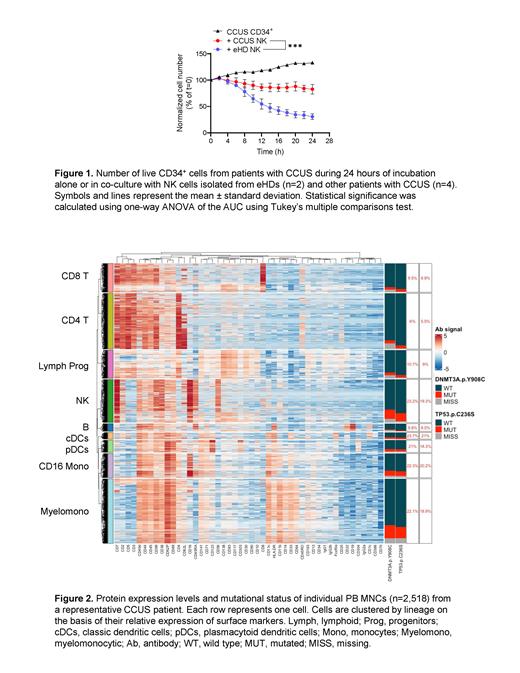Myelodysplastic syndromes (MDS) cannot be cured by standard pharmacological therapies owing to their inability to eradicate aberrant hematopoietic stem cells (HSCs). Given that developing early intervention strategies for MDS patients requires an improved understanding of the mechanisms underlying aberrant HSC expansion, we sought to elucidate how MDS HSCs evade immune surveillance and expand in patients with clonal cytopenias of undetermined significance (CCUS), the pre-malignant stage of MDS.
To characterize transcriptomic changes induced by CCUS in the aged immune microenvironment, we used single-cell RNA sequencing (scRNA-seq) of bone marrow (BM) mononuclear cells (MNCs) isolated from 2 young healthy donors (yHDs), 2 elderly healthy donors (eHDs), and 3 CCUS patients harboring mutations in MDS driver genes such as DNMT3A or TET2. CCUS immune cells were enriched in CD8 + T effector and NK cells, which were in activated states, characterized by the significant (P adj<0.05) upregulation of genes involved in protein translation, mitochondrial metabolism, and response to interferon signaling. A computational interactome analysis of ligand-receptor pair expression predicted gained intercellular communications among myeloid cells and CD8 + T and NK cells in CCUS patients compared with yHDs and eHDs, consistent with a tumor recognition process. However, CCUS CD8 + T and NK cells had downregulated NF-kB-mediated inflammatory signaling genes, which suggested a loss of proinflammatory capacity.
Because an efficient antitumor CD8 + T-cell response requires functional NK cells, we further dissected their functional state by performing scRNA-seq of CD3 + and/or CD56 + BM cells isolated from 2 yHDs, 2 eHDs, and 3 CCUS patients. A trajectory reconstruction analysis showed that CCUS NK cells were in more advanced differentiation states than HD NK cells were, which was confirmed by the significant downregulation of the transcription factor FOXO1 (P adj=1.17 x 10 -81). Differential gene expression analyses revealed that CCUS NK cells had significantly (P adj<0.05) upregulated MYC and mTOR target genes and genes involved in oxidative metabolism, protein synthesis, and immune signaling (consistent with an NK cell proliferative burst) compared with eHD NK cells, which suggests that CCUS NK cells are hyperactivated. However, cytokine secretion assays with K562 cells revealed that NK cells from 5 CCUS patients secreted significantly (P=0.002) less interferon gamma than those from 6 eHDs did. CCUS NK cells and eHD NK cells produced similar levels of granzyme and perforin, and CCUS NK cells could degranulate (based on CD107a expression); however, CCUS NK cells had significantly lower CD16 expression (P=0.008), which suggests an impaired capacity to form stable immune synapses and degranulate in a polarized manner. Indeed, compared with those from 3 yHDs and 4 eHDs, NK cells from 3 CCUS patients had a significantly (P<0.0001) impaired cytolytic capacity against leukemic cells that could not be rescued by prolonged culture with feeder cells. Moreover, NK cells from 4 CCUS patients failed to kill both heterotypic and isotypic CCUS CD34 + cells ex vivo (Fig. 1). To investigate the molecular mechanisms of NK cell dysfunction, we performed joint targeted single-cell DNA sequencing and immunophenotypic analyses of MNCs from 5 CCUS patients with DNMT3A or TET2 mutations, which revealed that NK cells were enriched in aberrant clones and had mutational burdens similar to those of myelomonocytes (Fig. 2). Deletion of DNMT3A or TET2 by CRISPR/Cas9 in cord blood-derived NK cells and subsequent killing assays showed a significant (P<0.0001) progressive loss of cytolytic capacity with tumor re-challenging in knock-out NK cells, which demonstrated that loss of function mutations in those genes are a direct cause of NK cell dysfunction in the context of sustained immune activation.
This study demonstrates that MDS driver mutations in CCUS NK cells induce immune dysfunction, thus enabling the expansion of malignant cells and thereby contributing to MDS onset. Our results suggest that immunotherapy with adoptive NK cell transfer could restore the anti-tumor immune response in patients with CCUS and may be an effective approach to arrest disease progression and prevent MDS onset.
Disclosures
Ma:Amgen: Current Employment. Chien:AbbVie: Consultancy; Rigel Pharmaceuticals: Consultancy. Loghavi:Caris Diagnostics: Consultancy; Blueprint Medicine: Consultancy; Abbvie: Consultancy; Gerson Lehrman Group: Consultancy; QualWorld: Consultancy; Guidepoint: Consultancy; Recordati/ EUSA Pharma: Consultancy; Daiichi Sankyo: Consultancy; Amgen: Research Funding; Astellas: Research Funding; Abbvie: Current equity holder in publicly-traded company. Rezvani:Affimed: Other: License agreement; Takeda: Patents & Royalties. Garcia-Manero:Bristol Myers Squibb: Other: Medical writing support, Research Funding; Genentech: Research Funding; AbbVie: Research Funding. Daher, MD:Takeda: Patents & Royalties.


This feature is available to Subscribers Only
Sign In or Create an Account Close Modal